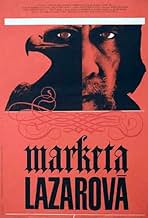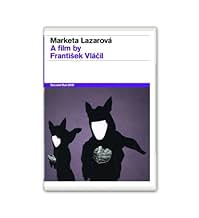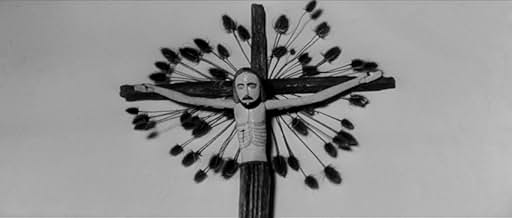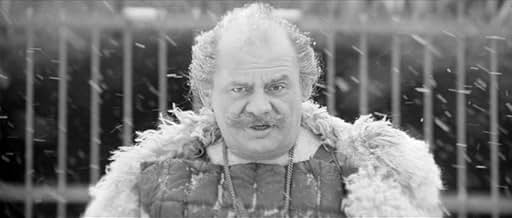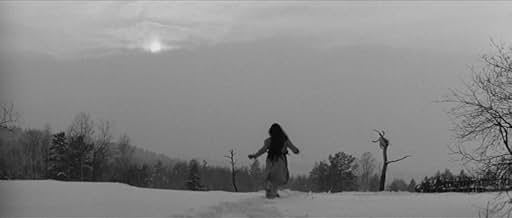AVALIAÇÃO DA IMDb
7,8/10
6,5 mil
SUA AVALIAÇÃO
Um retrato sombrio da mudança do paganismo para o cristianismo na Europa Central medieval: uma jovem virgem comprometida com Deus é sequestrada e estuprada por um homem saqueador que seu pai... Ler tudoUm retrato sombrio da mudança do paganismo para o cristianismo na Europa Central medieval: uma jovem virgem comprometida com Deus é sequestrada e estuprada por um homem saqueador que seu pai religioso procura matar em troca.Um retrato sombrio da mudança do paganismo para o cristianismo na Europa Central medieval: uma jovem virgem comprometida com Deus é sequestrada e estuprada por um homem saqueador que seu pai religioso procura matar em troca.
- Direção
- Roteiristas
- Artistas
- Prêmios
- 2 vitórias e 2 indicações no total
- Direção
- Roteiristas
- Elenco e equipe completos
- Produção, bilheteria e muito mais no IMDbPro
Avaliações em destaque
I've only seen this movie once, in a restored print at a film festival a few years back; it's apparently not available on video in the US, which is a real shame. It's a medieval epic, basically about the clash between the old pagan world and the emerging Christian one, but there's a lot more to it than that. Visually, it's nearly as stunning as *Andrei Rublev* (and a good bit faster-paced); some of the images - wolves roaming the barren forests, horsemen in snowstorms - will make the hairs on the back of your neck stand up. I'll admit that I'm a sucker for gloomy, wintry European art movies, especially if they work some bloody sword-fights in, too, but this is one of the overlooked Great Movies ...
UK DVD label Second Run which specializes in rare Eastern European classics have, over the last couple of years, released a handful of films I have long yearned to watch (and which, as a result of this viewing of MARKETA LAZAROVA, I've just ordered online): Aleksander Ford's KNIGHTS OF THE TEUTONIC ORDER (1960; a disc which despite its being trimmed by the BBFC and in an altered aspect ratio, I couldn't sensibly forego), Jerzy Kawalerowicz's MOTHER JOAN OF THE ANGELS (1961; their very first release which I purchased in London last year), Jan Nemec's THE PARTY AND THE GUESTS (1966) and, debuting in a few days' time, Miklos Jancso's THE ROUND-UP (1965).
Unlike these movies, I wasn't consciously aware of MARKETA LAZAROVA when the infectious buzz about its impending release hit the Internet but, as I later found out, the film was actually mentioned, ever so fleetingly, in one of my father's old movie magazines. Again, when the DVD was eventually released, there was a negative vibe about the alleged visual deficiencies of Second Run's disc but, in hindsight, these were quite needlessly exaggerated. Ultimately, an awesome and, as it turned out, essential movie experience such as this one deserves to be seen right away and to keep waiting for that perfectly pristine print to rear its unlikely head is utterly pointless. Alas, the Czech New Wave is still a largely undiscovered segment of cinema history for me so I am not in a position to suitably assess whether MARKETA LAZAROVA is indeed the greatest Czech movie ever made (as it had been judged in a 1998 poll among 100 native film critics). Suffice it to say that this ostensibly obscure film has by now figured in a number of published all-time best polls and, consequently, its status is deservedly well-established. Hopefully, as it was in my case, Second Run's DVD will serve as the introduction to many an adventurous film enthusiast in the future
Since my overall experience of MARKETA LAZAROVA was such a positive one, it seems only right to get my quibbles with the film out of the way first and there are basically two of them: a muddled storyline which, for most of the film's first half, left me rather perplexed as to which of the two warring factions the characters whose exploits I was following on screen belonged and, while things got clearer as time went by, the individuals themselves (with the obvious exception of the titular character) did not exactly garner much sympathy. I suppose that for a movie with a running time of almost three hours these flaws would usually be significantly detrimental to one's enjoyment of the whole: however, the definite impression I was left with while watching was that, despite the eponymous title, the director's intent was not to narrate a conventional life history but actually to create a visual tapestry of the medieval era onto celluloid and, in this regard, to say that he succeeded would be the understatement of the year. In fact, along with Andrei Tarkovsky's ANDREI RUBLEV (shot in 1965 but actually unreleased until 1972), I'd venture to say that MARKETA LAZAROVA is the most convincingly realized cinematic portrait of those turbulent times, distinguishing Frantisek Vlacil's vision as an overwhelmingly expansive and stunningly visual one.
In this context, it is quite appropriate that the titular character (played by a future Presidential candidate, the beautiful Magda Vasaryova) is practically silent for most of the film; she is first seen about to enter into a holy order but is eventually abducted, raped and impregnated by the feral Mikolas (who was actually raised by wolves) whom she comes to love eventually. Another parallel and equally unlikely relationship we are witness to is the one which blossoms between the earthy Alexandria (who is also involved in some brief but startling instances of full-frontal nudity) and her young, aristocratic captive who happens to be a German Bishop; it is worth noting here that Alexandria had already almost cost the life of her brother Adam when his own father had severed his arm in punishment for their incestuous coupling! Interestingly, the film is divided into two parts respectively entitled "Straba" and "The Lamb Of God" and punctuated by frequent, verbose, half Dickensian-half picaresque chapter headings, not to mention the presence on the soundtrack of a bemused narrator who, at one point, even takes on the role of God while interacting with a monk! This is not the only instance of whimsical inventiveness present in MARKETA LAZAROVA perhaps adopted by the director to counter the oppressively bleak ambiance created by the forbidding snowy landscape and dense forest settings which can actually claim to be the film's true main characters. As I said previously, striking images abound throughout: the intermittent, sinister appearance of the pack of wolves is impressively eerie, the distraught monk looking for his lamb and eventually losing her decapitated head down a clifftop, a horse drowning in a puddle on a deserted no man's land, the camera occasionally taking on a feverishly first person viewpoint according to the character at hand, the effective use of unheralded off-kilter compositions (including a totally bizarre arrow-in-the-eye shot!), etc. Having said that, Zdenek Liska's choral, percussive and electronic score is equally imaginative and, as a result, extraordinarily complementary to the uniquely sombre spectacle on constant display.
Unlike these movies, I wasn't consciously aware of MARKETA LAZAROVA when the infectious buzz about its impending release hit the Internet but, as I later found out, the film was actually mentioned, ever so fleetingly, in one of my father's old movie magazines. Again, when the DVD was eventually released, there was a negative vibe about the alleged visual deficiencies of Second Run's disc but, in hindsight, these were quite needlessly exaggerated. Ultimately, an awesome and, as it turned out, essential movie experience such as this one deserves to be seen right away and to keep waiting for that perfectly pristine print to rear its unlikely head is utterly pointless. Alas, the Czech New Wave is still a largely undiscovered segment of cinema history for me so I am not in a position to suitably assess whether MARKETA LAZAROVA is indeed the greatest Czech movie ever made (as it had been judged in a 1998 poll among 100 native film critics). Suffice it to say that this ostensibly obscure film has by now figured in a number of published all-time best polls and, consequently, its status is deservedly well-established. Hopefully, as it was in my case, Second Run's DVD will serve as the introduction to many an adventurous film enthusiast in the future
Since my overall experience of MARKETA LAZAROVA was such a positive one, it seems only right to get my quibbles with the film out of the way first and there are basically two of them: a muddled storyline which, for most of the film's first half, left me rather perplexed as to which of the two warring factions the characters whose exploits I was following on screen belonged and, while things got clearer as time went by, the individuals themselves (with the obvious exception of the titular character) did not exactly garner much sympathy. I suppose that for a movie with a running time of almost three hours these flaws would usually be significantly detrimental to one's enjoyment of the whole: however, the definite impression I was left with while watching was that, despite the eponymous title, the director's intent was not to narrate a conventional life history but actually to create a visual tapestry of the medieval era onto celluloid and, in this regard, to say that he succeeded would be the understatement of the year. In fact, along with Andrei Tarkovsky's ANDREI RUBLEV (shot in 1965 but actually unreleased until 1972), I'd venture to say that MARKETA LAZAROVA is the most convincingly realized cinematic portrait of those turbulent times, distinguishing Frantisek Vlacil's vision as an overwhelmingly expansive and stunningly visual one.
In this context, it is quite appropriate that the titular character (played by a future Presidential candidate, the beautiful Magda Vasaryova) is practically silent for most of the film; she is first seen about to enter into a holy order but is eventually abducted, raped and impregnated by the feral Mikolas (who was actually raised by wolves) whom she comes to love eventually. Another parallel and equally unlikely relationship we are witness to is the one which blossoms between the earthy Alexandria (who is also involved in some brief but startling instances of full-frontal nudity) and her young, aristocratic captive who happens to be a German Bishop; it is worth noting here that Alexandria had already almost cost the life of her brother Adam when his own father had severed his arm in punishment for their incestuous coupling! Interestingly, the film is divided into two parts respectively entitled "Straba" and "The Lamb Of God" and punctuated by frequent, verbose, half Dickensian-half picaresque chapter headings, not to mention the presence on the soundtrack of a bemused narrator who, at one point, even takes on the role of God while interacting with a monk! This is not the only instance of whimsical inventiveness present in MARKETA LAZAROVA perhaps adopted by the director to counter the oppressively bleak ambiance created by the forbidding snowy landscape and dense forest settings which can actually claim to be the film's true main characters. As I said previously, striking images abound throughout: the intermittent, sinister appearance of the pack of wolves is impressively eerie, the distraught monk looking for his lamb and eventually losing her decapitated head down a clifftop, a horse drowning in a puddle on a deserted no man's land, the camera occasionally taking on a feverishly first person viewpoint according to the character at hand, the effective use of unheralded off-kilter compositions (including a totally bizarre arrow-in-the-eye shot!), etc. Having said that, Zdenek Liska's choral, percussive and electronic score is equally imaginative and, as a result, extraordinarily complementary to the uniquely sombre spectacle on constant display.
"Marketa Lazarova" was a film I saw in 1970 at a small film theater in Minneapolis, Minnesota. It left an indelible memory, and I've spent years trying to find a way to see it again. At least once a year, I find a note I left about a phone call I've made to some obscure library or other such place in the hope of finding a way to see it.
The film won an Academy Award, and it should be remembered. It is stunning in black and white; the story is remarkable in its content and direction.
If anyone has ideas about how we fans can possibly revive this movie, we should try to do so. It is worth all the trouble and more just to see it again and again.
The film won an Academy Award, and it should be remembered. It is stunning in black and white; the story is remarkable in its content and direction.
If anyone has ideas about how we fans can possibly revive this movie, we should try to do so. It is worth all the trouble and more just to see it again and again.
I appreciate overseas even to notice this film, although I keep my doubt about the translation, for even the simplified movie dialogues are high-art and historizing. The film is based on Vladislav Vancura's brilliant novel (of the same name) its language level makes it untranslatable. It apparently caused my colleagues-in-comment some misunderstandings, for sure Czech King was no German in that time(even the christianity didn't come in our land germanways), only the noble man and his kidnapped son were.
This film is especially remarkable due to successful conversion of a great book into the great film (I don't recall many other examples at this level) and due to its capture of medieval. I hate medieval films with clean, stylish and crafty interiors, clothes etc. and bright light, for medieval was DARK, HARSH and DIRTY. What's the best part, Kozlik and Lazar were not just family-chieftains or family-heads, they were NOBLE MEN (feudals) and no matter whether they looked (and acted) like prowlers or not. Neither manners nor dresses were the significance of nobles in early medieval, the sword was (which no commoner was allowed to posses), better say swords and estates were.
This film is basically about weakness and strength in men. Lazar is thief and coward, kind of vulture, but Kozlik with his sons represents the willful and harsh power and bravery that summons an admiration of a sort, for they fear only the God, what makes them better christians than the sneaky Lazar jaws-full-of-Jesus.
Marketa, the unspoiled sweet child resembles all the clear, bright and pure in this world (and the only positive aspect of Lazar's sorry life), and is spoiled as everything clean and pure in this world might be. And she's devoted, first to God, then to earthly Mikolas.
I love the metaphore with zealot and little lamb, the connection between Marketa and the God's beast is obvious. Agnus Dei is another clear and bright to be tainted and consumpted by wild Kozlik's House.
And the sound and music, that's the world if its own, there's no music but sudden choir impacts!
This film is especially remarkable due to successful conversion of a great book into the great film (I don't recall many other examples at this level) and due to its capture of medieval. I hate medieval films with clean, stylish and crafty interiors, clothes etc. and bright light, for medieval was DARK, HARSH and DIRTY. What's the best part, Kozlik and Lazar were not just family-chieftains or family-heads, they were NOBLE MEN (feudals) and no matter whether they looked (and acted) like prowlers or not. Neither manners nor dresses were the significance of nobles in early medieval, the sword was (which no commoner was allowed to posses), better say swords and estates were.
This film is basically about weakness and strength in men. Lazar is thief and coward, kind of vulture, but Kozlik with his sons represents the willful and harsh power and bravery that summons an admiration of a sort, for they fear only the God, what makes them better christians than the sneaky Lazar jaws-full-of-Jesus.
Marketa, the unspoiled sweet child resembles all the clear, bright and pure in this world (and the only positive aspect of Lazar's sorry life), and is spoiled as everything clean and pure in this world might be. And she's devoted, first to God, then to earthly Mikolas.
I love the metaphore with zealot and little lamb, the connection between Marketa and the God's beast is obvious. Agnus Dei is another clear and bright to be tainted and consumpted by wild Kozlik's House.
And the sound and music, that's the world if its own, there's no music but sudden choir impacts!
Some of the most rewarding film experiences I know of annotate the medium itself, oftentimes than not so elliptically it's almost impossible to see at first. I don't mean Fellini's "8 ½" (1963) or "F for Fake" (1974) and their ilk; these are explicitly self-referential films, not that there's anything wrong in that. The films I am referring to aren't really self-referentially about film on narrative level, rather about something else entirely; they become film allegories by extension, as if in the periphery, accidentally.
"Marketa Lazarová" (1967), so audaciously otherworldly, is a film like that. I've seen it twice now, and slowly it's starting to reveal its riches. The first time around my expectations misled me to approach it as something closer to Tarkovsky's "Andrei Rublev" (1966), and while there are similarities, the film is so radical it's not that fitting a comparison in my mind.
The backdrop for the film is a profound historical and cultural paradigm shift where Christianity and paganism battle it out. Two opposites, the film can be seen as a poetic exploration of this struggle, and thus as a social document. While interesting, something else speaks to me more. For me the two allegorical forces at play are those of image and sound, and their use in film world, in filmic language. They often go their own ways, images showing us something and the narration swerving to somewhere else altogether, and the complex array of characters and their unorthodox introduction and presentation in the film underline the effect of confusion very powerfully. The overdubbed, echoing dialogue, often out of sync with the image, distracted me on first viewing, but it's unmistakably fitting in the grand scheme of things. Some images are so powerful I can't get them out of my mind (not that I'd want to, mind you!)
And the music! It's the highest compliment I can think of when I say for a film so visually rich that you should not only see it but listen to it. Liska's contribution to the film in some ways contributes to the modest thesis I've been trying to form in so short a space, that is the wonderful interplay of sound and image. Kieslowski's "Trois couleurs: Bleu" (1993) might compare if I wanted to search for something as equally stunning as this.
And I can't write about the film without mentioning the most wonderful sound I've come across in film. It's the convent bell, and one can hear it towards the very beginning, during the revelation and just before the intertitles, I think, and I think it's repeated at least once later on.
All in all, what an experience. We're lucky to have two Blu-rays of the film, the first a Czech Region B, the second a Criterion Region A release. The first one does have English subtitles.
"Marketa Lazarová" (1967), so audaciously otherworldly, is a film like that. I've seen it twice now, and slowly it's starting to reveal its riches. The first time around my expectations misled me to approach it as something closer to Tarkovsky's "Andrei Rublev" (1966), and while there are similarities, the film is so radical it's not that fitting a comparison in my mind.
The backdrop for the film is a profound historical and cultural paradigm shift where Christianity and paganism battle it out. Two opposites, the film can be seen as a poetic exploration of this struggle, and thus as a social document. While interesting, something else speaks to me more. For me the two allegorical forces at play are those of image and sound, and their use in film world, in filmic language. They often go their own ways, images showing us something and the narration swerving to somewhere else altogether, and the complex array of characters and their unorthodox introduction and presentation in the film underline the effect of confusion very powerfully. The overdubbed, echoing dialogue, often out of sync with the image, distracted me on first viewing, but it's unmistakably fitting in the grand scheme of things. Some images are so powerful I can't get them out of my mind (not that I'd want to, mind you!)
And the music! It's the highest compliment I can think of when I say for a film so visually rich that you should not only see it but listen to it. Liska's contribution to the film in some ways contributes to the modest thesis I've been trying to form in so short a space, that is the wonderful interplay of sound and image. Kieslowski's "Trois couleurs: Bleu" (1993) might compare if I wanted to search for something as equally stunning as this.
And I can't write about the film without mentioning the most wonderful sound I've come across in film. It's the convent bell, and one can hear it towards the very beginning, during the revelation and just before the intertitles, I think, and I think it's repeated at least once later on.
All in all, what an experience. We're lucky to have two Blu-rays of the film, the first a Czech Region B, the second a Criterion Region A release. The first one does have English subtitles.
Você sabia?
- CuriosidadesFrantisek Vlácil not only had the clothes painstakingly researched and hand-sewn, he had the cast live in the forest for the two years of shooting so they could get into the 13th century mindset.
- Erros de gravaçãoIn a scene where Marketa observes a reindeer in the forest, you can see a director Frantisek Vlácil in jacket in the left of the frame. He was actually trying to scare deer, because they didn't want to move. This could be seen only on some of the Blu-Ray and DVD versions.
- Versões alternativasThe UK release was cut, a cut was required to remove sight of a snake being stabbed and rearing up in pain, in order to obtain a 15 classification. The cut was made on the basis of BBFC policy on genuine animal cruelty. An uncut classification was not available.
- ConexõesEdited into CzechMate: In Search of Jirí Menzel (2018)
Principais escolhas
Faça login para avaliar e ver a lista de recomendações personalizadas
- How long is Marketa Lazarová?Fornecido pela Alexa
Detalhes
- Tempo de duração
- 2 h 42 min(162 min)
- Cor
- Mixagem de som
- Proporção
- 2.35 : 1
Contribua para esta página
Sugerir uma alteração ou adicionar conteúdo ausente

![Assistir a Trailer [OV]](https://m.media-amazon.com/images/M/MV5BOGZhMmFmMGQtNGZhMi00M2QzLWExMjItZjJkZTVhMmEzYzJjXkEyXkFqcGdeQXRyYW5zY29kZS13b3JrZmxvdw@@._V1_QL75_UX500_CR0)
